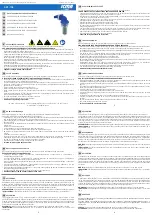
Setting Up Cisco Unified IP Phones using SIP
Information About Configuring the SIP Registrar
106
Cisco Unified SCCP and SIP SRST System Administrator Guide
OL-13143-04
Information About Configuring the SIP Registrar
Cisco Unified SIP SRST provides backup to an external SIP proxy server by providing basic registrar
and call handling services. These services are used by a SIP IP phone in the event of a WAN connection
outage when the SIP phone is unable to communicate with its primary SIP proxy. The Cisco Unified SIP
SRST device also provides PSTN gateway access for placing and receiving PSTN calls.
Cisco Unified SIP SRST works for the following types of calls:
•
Local SIP IP phone to local SIP phone, if the main proxy is unavailable.
•
Additional services like class of restriction (COR) for local SIP IP phones to the outgoing PSTN.
For example, to block outgoing 1-900 numbers.
How to Configure the SIP Registrar
This section contains the following procedures:
•
Configuring the SIP Registrar, page 106
(required)
•
Configuring Backup Registrar Service to SIP Phones, page 108
(required)
•
Configuring Backup Registrar Service to SIP Phones (Using Optional Commands), page 112
(optional)
•
Verifying SIP Registrar Configuration, page 115
(optional)
•
Verifying Proxy Dial-Peer Configuration, page 117
(optional)
Configuring the SIP Registrar
The local SIP gateway that becomes the SIP registrar acts as a backup SIP proxy and accepts SIP
Register messages from SIP phones. It becomes a location database of local SIP IP phones.
A registrar accepts SIP Register requests and dynamically builds VoIP dial peers, allowing the Cisco IOS
voice gateway software to route calls to SIP phones.
If a SIP Register request has a Contact header that includes a DNS address, the Contact header is
resolved before the contact is added to the SIP registrar database. This is done because during a WAN
failure (and the resulting Cisco Unified SIP SRST functionality), DNS servers may not be available.
SIP registrar functionality is enabled with the following configuration. By default, Cisco Unified SIP
SRST is not enabled and cannot accept SIP Register messages. The following configuration must be set
up to accept incoming SIP Register messages.
















































